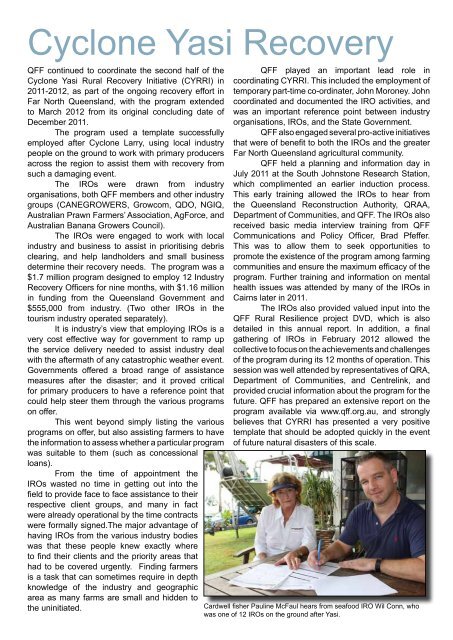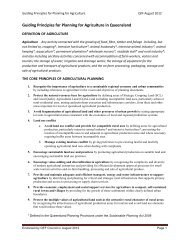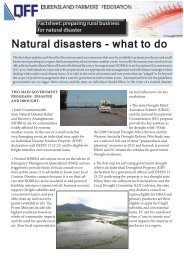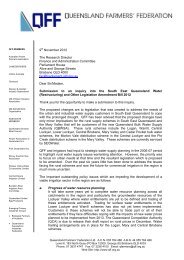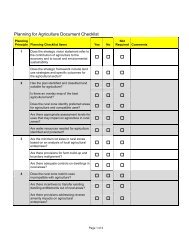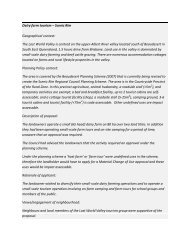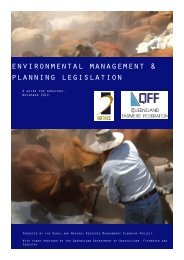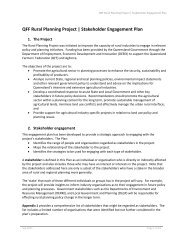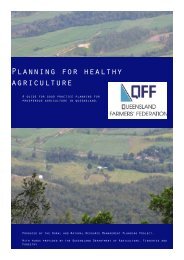here - Queensland Farmers Federation
here - Queensland Farmers Federation
here - Queensland Farmers Federation
Create successful ePaper yourself
Turn your PDF publications into a flip-book with our unique Google optimized e-Paper software.
Cyclone Yasi Recovery<br />
QFF continued to coordinate the second half of the<br />
Cyclone Yasi Rural Recovery Initiative (CYRRI) in<br />
2011-2012, as part of the ongoing recovery effort in<br />
Far North <strong>Queensland</strong>, with the program extended<br />
to March 2012 from its original concluding date of<br />
December 2011.<br />
The program used a template successfully<br />
employed after Cyclone Larry, using local industry<br />
people on the ground to work with primary producers<br />
across the region to assist them with recovery from<br />
such a damaging event.<br />
The IROs were drawn from industry<br />
organisations, both QFF members and other industry<br />
groups (CANEGROWERS, Growcom, QDO, NGIQ,<br />
Australian Prawn <strong>Farmers</strong>’ Association, AgForce, and<br />
Australian Banana Growers Council).<br />
The IROs were engaged to work with local<br />
industry and business to assist in prioritising debris<br />
clearing, and help landholders and small business<br />
determine their recovery needs. The program was a<br />
$1.7 million program designed to employ 12 Industry<br />
Recovery Officers for nine months, with $1.16 million<br />
in funding from the <strong>Queensland</strong> Government and<br />
$555,000 from industry. (Two other IROs in the<br />
tourism industry operated separately).<br />
It is industry’s view that employing IROs is a<br />
very cost effective way for government to ramp up<br />
the service delivery needed to assist industry deal<br />
with the aftermath of any catastrophic weather event.<br />
Governments offered a broad range of assistance<br />
measures after the disaster; and it proved critical<br />
for primary producers to have a reference point that<br />
could help steer them through the various programs<br />
on offer.<br />
This went beyond simply listing the various<br />
programs on offer, but also assisting farmers to have<br />
the information to assess whether a particular program<br />
was suitable to them (such as concessional<br />
loans).<br />
From the time of appointment the<br />
IROs wasted no time in getting out into the<br />
field to provide face to face assistance to their<br />
respective client groups, and many in fact<br />
were already operational by the time contracts<br />
were formally signed.The major advantage of<br />
having IROs from the various industry bodies<br />
was that these people knew exactly w<strong>here</strong><br />
to find their clients and the priority areas that<br />
had to be covered urgently. Finding farmers<br />
is a task that can sometimes require in depth<br />
knowledge of the industry and geographic<br />
area as many farms are small and hidden to<br />
the uninitiated.<br />
QFF played an important lead role in<br />
coordinating CYRRI. This included the employment of<br />
temporary part-time co-ordinater, John Moroney. John<br />
coordinated and documented the IRO activities, and<br />
was an important reference point between industry<br />
organisations, IROs, and the State Government.<br />
QFF also engaged several pro-active initiatives<br />
that were of benefit to both the IROs and the greater<br />
Far North <strong>Queensland</strong> agricultural community.<br />
QFF held a planning and information day in<br />
July 2011 at the South Johnstone Research Station,<br />
which complimented an earlier induction process.<br />
This early training allowed the IROs to hear from<br />
the <strong>Queensland</strong> Reconstruction Authority, QRAA,<br />
Department of Communities, and QFF. The IROs also<br />
received basic media interview training from QFF<br />
Communications and Policy Officer, Brad Pfeffer.<br />
This was to allow them to seek opportunities to<br />
promote the existence of the program among farming<br />
communities and ensure the maximum efficacy of the<br />
program. Further training and information on mental<br />
health issues was attended by many of the IROs in<br />
Cairns later in 2011.<br />
The IROs also provided valued input into the<br />
QFF Rural Resilience project DVD, which is also<br />
detailed in this annual report. In addition, a final<br />
gathering of IROs in February 2012 allowed the<br />
collective to focus on the achievements and challenges<br />
of the program during its 12 months of operation. This<br />
session was well attended by representatives of QRA,<br />
Department of Communities, and Centrelink, and<br />
provided crucial information about the program for the<br />
future. QFF has prepared an extensive report on the<br />
program available via www.qff.org.au, and strongly<br />
believes that CYRRI has presented a very positive<br />
template that should be adopted quickly in the event<br />
of future natural disasters of this scale.<br />
Cardwell fisher Pauline McFaul hears from seafood IRO Wil Conn, who<br />
was one of 12 IROs on the ground after Yasi.


